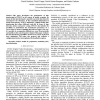Free Online Productivity Tools
i2Speak
i2Symbol
i2OCR
iTex2Img
iWeb2Print
iWeb2Shot
i2Type
iPdf2Split
iPdf2Merge
i2Bopomofo
i2Arabic
i2Style
i2Image
i2PDF
iLatex2Rtf
Sci2ools
118
click to vote
VTC
2010
IEEE
2010
IEEE
Performance Evaluation of DVB-T2 Time Interleaving in Mobile Environments
—This paper investigates the performance of time interleaving in DVB-T2 in the context of mobile reception. By means of time interleaving it is possible to provide time diversity and improve the robustness of the transmitted information in mobile environments. DVB-T2 implements a highly flexible time interleaving that allows different trade-offs in terms of time diversity, latency and power saving. DVB-T2 also includes the possibility to particularize the transmission parameters on a service basis by means of multiple physical layer pipes. This way, it is possible to accommodate different use cases: fixed, portable and mobile, in the same frequency channel. This paper evaluates the time interleaving capabilities of DVB-T2 by means of physical layer simulations. The paper also proposes and evaluates a configuration that has been optimized for handheld reception. Keywords; DVB-T2, mobile TV, performance evaluation, FEC, time interleaving
Communications | DVB-T2 | Interleaving | Time Diversity | VTC 2010 |
Related Content
| Added | 31 Jan 2011 |
| Updated | 31 Jan 2011 |
| Type | Journal |
| Year | 2010 |
| Where | VTC |
| Authors | David Gozalvez, David Vargas, David Gomez-Barquero, Narcís Cardona |
Comments (0)

